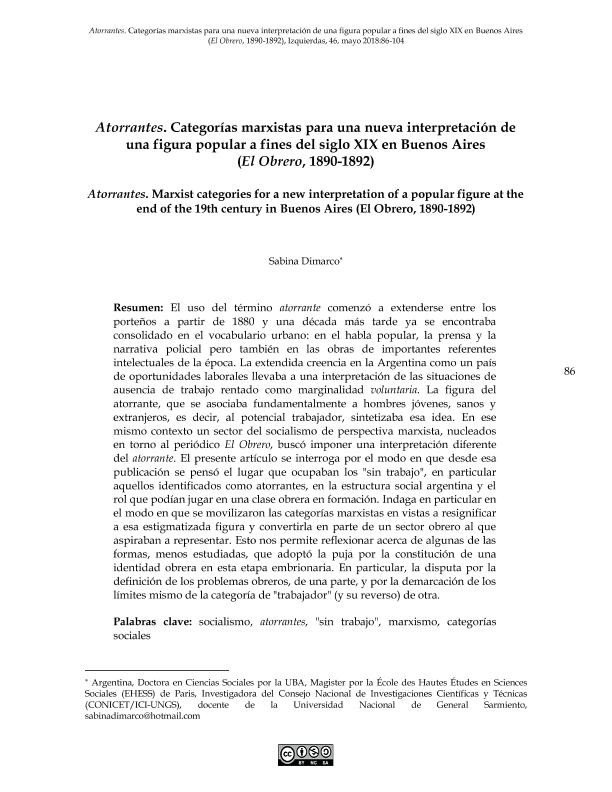Mostrar el registro sencillo del ítem
dc.contributor.author
Dimarco, Sabina Alejandra

dc.date.available
2022-11-02T14:53:31Z
dc.date.issued
2019-05
dc.identifier.citation
Dimarco, Sabina Alejandra; Atorrantes: Categorías marxistas para una nueva interpretación de una figura popular a fines del siglo XIX en Buenos Aires (El Obrero, 1890-1892); Ariadna Ediciones; Izquierdas; 46; 5-2019; 86-104
dc.identifier.issn
0718-5049
dc.identifier.uri
http://hdl.handle.net/11336/175990
dc.description.abstract
El uso del término atorrante comenzó a extenderse entre los porteños a partir de 1880 y una década más tarde ya se encontraba consolidado en el vocabulario urbano: en el habla popular, la prensa y la narrativa policial pero también en las obras de importantes referentes intelectuales de la época. La extendida creencia en la Argentina como un país de oportunidades laborales llevaba a una interpretación de las situaciones de ausencia de trabajo rentado como marginalidad voluntaria. La figura del atorrante, que se asociaba fundamentalmente a hombres jóvenes, sanos y extranjeros, es decir, al potencial trabajador, sintetizaba esa idea. En ese mismo contexto un sector del socialismo de perspectiva marxista, nucleados en torno al periódico El Obrero, buscó imponer una interpretación diferente del atorrante. El presente artículo se interroga por el modo en que desde esa publicación se pensó el lugar que ocupaban los "sin trabajo", en particular aquellos identificados como atorrantes, en la estructura social argentina y el rol que podían jugar en una clase obrera en formación. Indaga en particular en el modo en que se movilizaron las categorías marxistas en vistas a resignificar a esa estigmatizada figura y convertirla en parte de un sector obrero al que aspiraban a representar. Esto nos permite reflexionar acerca de algunas de las formas, menos estudiadas, que adoptó la puja por la constitución de una identidad obrera en esta etapa embrionaria. En particular, la disputa por la definición de los problemas obreros, de una parte, y por la demarcación de los límites mismo de la categoría de "trabajador" (y su reverso) de otra.
dc.description.abstract
The use of the term atorrante began to be spread among locals after 1880 and, a decade later, was already consolidated in the urban vocabulary: in popular language, the press and police narrative but also in the works of important intellectual referents. Because of the wide belief that Argentina was a country of job opportunities, the situations of absence of paid work used to be interpreted as voluntary marginality. The atorrante, who was associated with a young man, healthy and foreign, that is, the potential worker, synthesized that idea. In that same context, a sector of socialist with a marxist perspective, centered around the newspaper El Obrero, sought to impose a different interpretation of the atorrante. This article analyzes the way in wich the place occupied by the "without work" was considered from that publication-particularly those identified as atorrantes- in the Argentine social structure and the role they could play in a working class formation. The aim of the article is to analyse the use of marxist categories in order of resignify that stigmatized figure and include it in the worker's sector to which they aspired to represent. This allows us to reflect on some of the less studied forms adopted by the fight for the constitution of a worker identity in this embryonic stage. In particular, the dispute over the definition of workers' problems and the demarcation of the limits of the category of "worker" (and its reverse side).
dc.format
application/pdf
dc.language.iso
spa
dc.publisher
Ariadna Ediciones
dc.rights
info:eu-repo/semantics/openAccess
dc.rights.uri
https://creativecommons.org/licenses/by-nc-sa/2.5/ar/
dc.subject
"OUT OF WORK"
dc.subject
ATORRANTES
dc.subject
MARXISM
dc.subject
SOCIAL CATEGORIES
dc.subject
SOCIALISM
dc.subject.classification
Ciencias Sociales Interdisciplinarias

dc.subject.classification
Otras Ciencias Sociales

dc.subject.classification
CIENCIAS SOCIALES

dc.title
Atorrantes: Categorías marxistas para una nueva interpretación de una figura popular a fines del siglo XIX en Buenos Aires (El Obrero, 1890-1892)
dc.title
Atorrantes: Marxist categories for a new interpretation of a popular figure at the end of the 19th century in Buenos Aires (El Obrero, 1890-1892)
dc.type
info:eu-repo/semantics/article
dc.type
info:ar-repo/semantics/artículo
dc.type
info:eu-repo/semantics/publishedVersion
dc.date.updated
2022-11-01T23:23:54Z
dc.journal.number
46
dc.journal.pagination
86-104
dc.journal.pais
Chile

dc.journal.ciudad
Santiago de Chile
dc.description.fil
Fil: Dimarco, Sabina Alejandra. Consejo Nacional de Investigaciones Científicas y Técnicas; Argentina. Universidad Nacional de General Sarmiento. Instituto de Ciencias; Argentina
dc.journal.title
Izquierdas
dc.relation.alternativeid
info:eu-repo/semantics/altIdentifier/url/https://www.izquierdas.cl/images/html/n46/index46.html
dc.relation.alternativeid
info:eu-repo/semantics/altIdentifier/url/https://www.scielo.cl/scielo.php?script=sci_arttext&pid=S0718-50492019000200086&lng=es&nrm=iso&tlng=es
dc.relation.alternativeid
info:eu-repo/semantics/altIdentifier/doi/http://dx.doi.org/10.4067/S0718-50492019000200086
Archivos asociados
